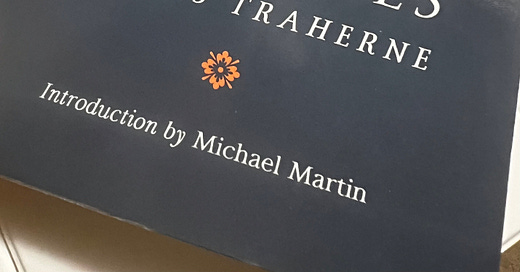Hello all, as many of you know, I am a graduate student at the University of St. Thomas in Houston, studying poetry in their most excellent MFA in Creative Writing program. Right now I am taking Poetry of Meditation with Ryan Wilson (soon-to-be former editor of Literary Matters, author of In Ghostlight, and co-editor of a new anthology of Christian poetry). Wilson is an excellent teacher thus far, but one of the adjustments I’ve had to make (and have heard that other people have had to make) is the amount of reading that is assigned. Fortunately, I caught that we had a whole book that we needed to read in addition to our packet work, and I finished my reading early this morning.
However, it turns out that maybe a classmate or two may be underwater with their reading of Thomas Traherne’s Centuries.
So I thought, “I should just write some tips on reading a book like this very fast…”
Besides I already had done this before with the Brothers Karamazov when some of my friends were trying to finish it before a retreat a couple of years ago. I could just take some of those tips and adjust them to this particular scenario.
How to Read a Long, Complicated Novel Very Quickly
Hello. I am so glad you are here. I will leave some personal news at the bottom of the post.
Centuries is not nearly as long and complex as the Brothers K, but it also isn’t intuitive reading for readers of modern literature.
Here are some tips, if you only have a few hours to get through this 228 page text:1
Get comfortable and get your tools out. You will need a pencil, eraser, and sticky flags. You may also want to print out this Fast Book Outliner (FBO) that I use. There are several different formats on the right hand side of the website.
Scan the text with your fingers — twice. Four flat fingers all the way down each page, and then turn back to the beginning do an “Z” scan where you follow your fingers in a “Z” motion. This is a very quick step, but it can be helpful for you to see the structure of the book and the vocabulary of the prose (which is delightfully uncomplicated).
Read quickly for key concepts and look for themes. Fortunately for my classmates Traherne is rather repetitive which makes fast reading much easier, but this also means the ideas he is contemplating are very important.
Write a one word or single phrase summary on the top of every page if you can manage it. This helps tremendously with comprehension. Here are examples, but please note that had I known at the time that I was going to share this on my Substack I would have written a lot neater.
Write an index on a blank area of the book for items you want to discuss in class or important points you may need for a paper. You can also use the FBO for this as well if you don’t want to write in your book.
Another tip, do not skip introductions to these types of texts. This isn’t the type of book where the plot gets spoiled. Michael Martin’s introduction helps the reader who is pressed for time with getting her bearings. I found this part is particularly interesting:
The cumulative effect of Traherne's work, then, is to convince the reader that "the kingdom of heaven is within you." That is, felicity appears when we learn to see the world as it is, as God sees it. Traherne's spirituality can be called "Edenic," as he time and again invites us to return to what Dylan Thomas described as "the birth of the simple light / In the first, spinning place" when "it was all / Shining," when "it was Adam and maiden." But he simultaneously, and gently, invites us to see the world in its glorified form, marrying ontos to telos in perhaps one of the most daring-and most honest-confessions to be found in Christian poetics.
For this particular book, try to find out what happens in each Century. What is the theme of each section? What images does the author use? What is Felicity? What is Divine Wisdom? What role does Beauty play in relation to God’s relationship to Man?
In my previous post I made this point that bears repeating:
When you are reading a book extremely fast, you can fall into the trap of trying to torture a great work into telling you its truths. Don’t let that happen.
Think about this reading like being invited to meet someone famous and important for a short visit. Ask the questions you most want to ask. Enjoy the charisma of whom you are visiting, and let them be their best and most gracious self. Let them teach you whatever they know, and know that the door is always open for a longer visit at a later time.
I think this part still holds true. I found this book a lovely read—a cross between certain parts of St. Augustine’s writings and Gerard Manley Hopkins in his happiest days: The world is charged with the grandeur of God.
Traherne’s poetry is elucidated by Centuries, but this is something that I should probably go into at a later time. In the meantime, I leave you with some words from his poem “The Recovery”:
In all His works, in all His ways, We must His glory see and praise; And since our pleasure is the end, We must His goodness and His love attend.
And now hopefully this may help a friend or two attend to some reading, and I can get some sleep.
Even if you are not in this class with me, did you find any of these tips helpful?
Do you think this would be helpful to a student you know?
To get all the links and names of books I used as resources for this shorter post please click the older post (above).









Excellent and valuable advice!
Zina, thank you for this; it may be very helpful for absorbing large quantities of prose, especially in the required reading for a course. But what happens to the sound of the language when you do this? I’ve discovered, in teaching my Natural Meter Crash Course, that there are many poets who loved metrical verse in childhood but now can’t seem to hear or follow meter. They want to retrain their inner ear to hear the sound of language. Some of them had learned a speed-reading technique while in college. I tried that at one point, but didn’t like the way it “turned off” my inner ear. What do you think about this?